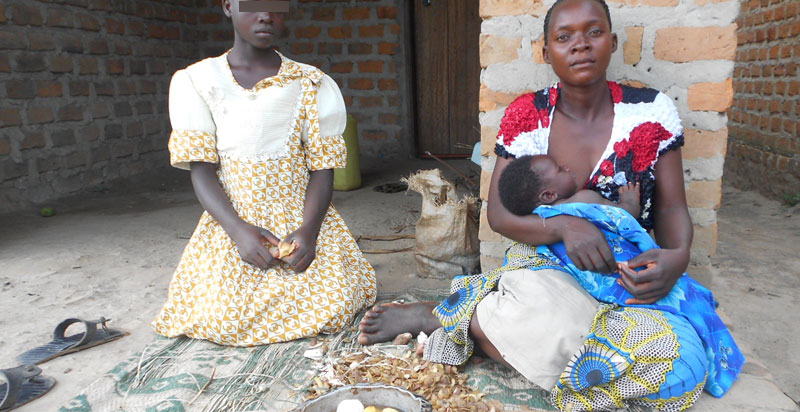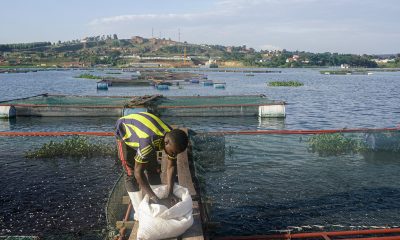Analysis
Defiled in Headmaster’s House
Suspect walks free as Police are suspected of foiling case
Naggulu village, a symbol of spiritual and material optimism in a way, is now to little Jamilah (not real name) a dark cave she regrets ever having set foot in.
Jamilah (not real name), 13, a Primary Six pupil of Naggulu Umea primary school, was defiled here last November in the house of the secondary school’s headteacher. Out of embarrassment she has quit school. But the alleged defiler is at large after spending just about a month in police cells.
“It [defilement] happened in November [2014]. I can’t go back to school. Everyone knows I was raped,” Jamilah says, with her head bowed down and eyes fixed to the ground.
John Wagaba, 58, the security guard of the secondary school, allegedly used fried cassava as bait to trap Jamilah into the headteacher’s house where he had sex with her. Wagaba is reported to have two partners and three children on the same village.
Jamilah’s story started as a rumour – that a girl who was living with her grandfather had been “raped”; that for two weeks she had not attended school due to injuries sustained in a forced sexual intercourse. The village kept grumbling about Wagaba. For months men feared for their wives and daughters, women feared for their children. The bubble burst on May 24, 2015, when a village meeting, convened by Naggulu village Chairman Sulaiman Kakande, charged Wagaba with defilement and got him immediately arrested by the police.
“The girl never told us. We heard about it from rumours on the village,” says Jane Namata, Jamilah’s guardian and wife to her grandfather, Erias Kirumira. Jamilah lived with this family. “During the village meeting some women took her aside and told her that if she did not confess she would be imprisoned. That is when she confessed,” adds Namata.
Namata and her husband, however, are rumoured to have known about the incident earlier but pocketed Ushs.500,000 from Wagaba to conceal information, an allegation they deny.
“The whole village knew that the child had been raped. We have been hearing that the man gave the family Ushs.500,000 to settle the issue,” says James Matembe, a resident. The police never picked interest in this allegation.
Wagaba was reportedly kept for three days at Namutumba police post and then transferred to Kakiri police station. That is when confusion and fear that Wagaba’s crimes would go unpunished ensued.
Jennifer Tafanika, Jamilah’s mother, had brought her daughter two years earlier to Naggulu from Busoga so she could grow up on her paternal side. Jamilah was then in Primary Four.
“I was called from Busoga that there was a major issue with my daughter. When I came here they explained to me and took me to the police station. The man [Wagaba] was brought out from the cells to me and when he saw me he confessed that he had raped my daughter. He said ‘I raped the girl. I am the askari [guard] at the secondary school and I also sell fried cassava at the school canteen. Please forgive me,'” says Tafanika.
“The police said the file had been brought back from Wakiso to Kakiri. They asked me to produce the birth certificate and baptism card of the child. I told them I had some documents back home in Busoga, and I had no transport to go back there. But they insisted that I should find means or else I had no proof that the girl was young,” Tafanika adds.
Tafanika narrates that the police then asked her for “transport” to take the girl to a doctor in Nsambya Hospital to check whether she had been exposed to sex. “I told them I did not have the money. They promised that they would pick me from home and take me to Nsambya but they again came home and asked for money,” she says.
“Afterwards one of the policemen told me he would transport the child and I should transport myself. In the morning he called and told me that the doctor we were going to see was not there. That was the last time I heard from them. That was last Friday [June 12]. I am here two weeks. What shocks me is that the family where my daughter was defiled is on the defiler’s side,” adds a visibly frustrated Tafanika.
Tafanika rented a small room in Naggulu where she lived with Jamilah, with the hope that Wagaba would be punished but early this month, she learnt that Wagaba was a free man.
In what appeared a calculated move, the village, which is without much literacy, was being told that Wagaba had been remanded to Sentema Prison. Sources say that Wagaba was kept in Kakiri Police cells for a month and released on bond. He was never committed to court.
Haji Mudathim Lutale, the headteacher whose house was used by Wagaba could not confirm the defilement. And he said he did not know how far the case had reached.
“I can’t say it [the defilement] is true because I did not witness it. This was my school askari [guard] and I had given him my house to keep it for me. The issue happened in the community. This is a day school. What I heard is that the man had agreed with the family and that they had settled the issue but maybe after a misunderstanding they decided to bring it back,” Lutale said.
Although Lutale said he headed a day school, investigations have established that there are students, boys and girls, accommodated at the school in a dormitory setting.
Jamir Kiwalabye, the headteacher Nagulu Umea PS, talked of the child as being so polite, an attribute Wagaba could have exploited.
“The child has been very polite and irregular at school. There must have been laziness on the side of the guardians. The child would even lack basic tools like pens, books,” he said.
Efforts to get the Police’s position were futile as Police at Namayumba referred the writer to the Police Public Relations Officer (PRO) Fred Enanga. Enanga picked his phone and asked the writer to send him an SMS about the issue. By press time he had not yet responded.
On August 5, 2015, the police of Namayumba went to Naggulu village and are reported to have intimidated people out of discussing Wagaba’s issue. Najib Ssekito, Robert Kasozi, and one Yombo were arrested and later released on Police bond, apparently for threatening Wagaba’s wife whom he had been only visiting at night, after being released by the police.
Wagaba, when contacted by phone, pretended to not understand Luganda. He responded in Kiswahili after a long hesitation: Mimi si Wagaba meaning I am not Wagaba.
Comments



















